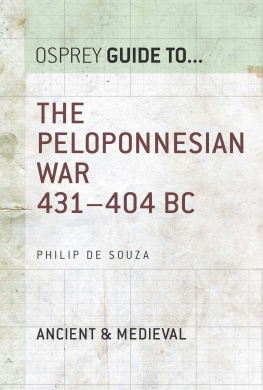De Souza - The Peloponnesian War, 431-404 BC
Here you can read online De Souza - The Peloponnesian War, 431-404 BC full text of the book (entire story) in english for free. Download pdf and epub, get meaning, cover and reviews about this ebook. City: Greece, year: 2014, publisher: Osprey Publishing, genre: History. Description of the work, (preface) as well as reviews are available. Best literature library LitArk.com created for fans of good reading and offers a wide selection of genres:
Romance novel
Science fiction
Adventure
Detective
Science
History
Home and family
Prose
Art
Politics
Computer
Non-fiction
Religion
Business
Children
Humor
Choose a favorite category and find really read worthwhile books. Enjoy immersion in the world of imagination, feel the emotions of the characters or learn something new for yourself, make an fascinating discovery.
The Peloponnesian War, 431-404 BC: summary, description and annotation
We offer to read an annotation, description, summary or preface (depends on what the author of the book "The Peloponnesian War, 431-404 BC" wrote himself). If you haven't found the necessary information about the book — write in the comments, we will try to find it.
The Peloponnesian War, 431-404 BC — read online for free the complete book (whole text) full work
Below is the text of the book, divided by pages. System saving the place of the last page read, allows you to conveniently read the book "The Peloponnesian War, 431-404 BC" online for free, without having to search again every time where you left off. Put a bookmark, and you can go to the page where you finished reading at any time.
Font size:
Interval:
Bookmark:

Guide To
The Peloponnesian War 431404 BC
Philip de Souza

Contents
Introduction
This book gives a concise account of one of the key periods of Classical Greek history. The Peloponnesian War, which lasted from 431 to 404 BC, was a conflict between the Greek city-states of Athens and Sparta. It was a confrontation between the leading land power of the time, Sparta, and the leading sea power, Athens. In a wider sense it was also a clash between a cautious, traditional oligarchy and an ambitious, innovative democracy. It is called the Peloponnesian War because Sparta was the head of an alliance of Greek states from the Peloponnese, the southernmost peninsula of mainland Greece. The stories of the Peloponnesian War feature some of the great personalities of the Classical World, including the revered Athenian statesman Perikles, the bold and resourceful Spartans Brasidas and Gylippos, the flamboyant Athenian general Alkibiades and the Spartan leader Lysandros, who eventually achieved the decisive naval victory that the Spartans needed to win the war.
The enduring fame of the Peloponnesian War is due in no small way to its principal historian, Thucydides, an Athenian citizen who took part in some of the early stages of the war as a naval commander. He was exiled from Athens in 424 and he decided to write a detailed account of the war because, in his view, it was such an important war that it was more worthy of a written history than any previous conflict. He carefully gathered as much information as possible, from eye-witnesses and documents, so that he could offer as accurate and well considered an analysis of events as possible. He was aware that this sort of history might not appeal to those who preferred a more romanticised and sensational account of the past, but he observed in his introduction: This is a possession for all time, rather than a prize piece that is read and then forgotten.
Thucydides work is incomplete, tailing off literally in mid sentence, just as he is explaining what happened after an Athenian naval victory in 411. It is likely that he had either died, or at least stopped working on it by 396 because he does not seem to know about an eruption of Mount Etna on Sicily that occurred in this year. We do not know whether he simply had not written any of the remaining books which would have covered the period 410 to 404 (there were probably to be two more), or whether he had drafts or notes but no final versions.
Another Athenian historian, Xenophon, continued the story of the war from a point just a few months after the latest events recorded by Thucydides. This could imply that Xenophon had a version of Thucydides work which was slightly longer than the one which now survives, for it seems clear that he intended his to be a continuation of Thucydides, although he is less detailed and analytical than Thucydides. Xenophon called his work the Hellenika, meaning an account of the doings of the Hellenes, which was the Greeks name for themselves. We can supplement these two main accounts from the works of many later classical writers, who provide biographical and historical details not mentioned by Thucydides or Xenophon, along with a small number of original documents from the time of the war, mostly decrees of the Athenians inscribed on stone.
Thucydides was the first writer who, in explaining the origins of a war, made a clear distinction between the immediate, publicly proclaimed reasons for the conflict and the longer-term, underlying causes of tension between the two sides. This explanatory scheme is still regularly employed by modern historians when they seek to account for the outbreak of more recent wars. It is a testament to the fascination of Thucydides subject and the quality of his work that, even in the twenty-first century, students of history, politics and warfare in universities and military academies across the world regularly study the events of the Peloponnesian War for the lessons it can teach them about politics, diplomacy, strategy, tactics and the writing of history.
Chronology
| 478 | Formation of the Delian League |
| 46564 | Earthquake at Sparta; (Messenian) Helots revolt |
| 462 | Spartans appeal for Athenian help against Messenians; Kimons forces sent away by Spartans; reforms of Ephialtes; Athenians form alliance with Megara, Argos and Thessaly |
| 461 | Ostracism of Kimon |
| 45954 | Athenian expedition to Cyprus and Egypt |
| 459 | Athenians begin building their Long Walls |
| 457 | Battles of Tanagra and Oinophyta |
| 456 | Defeat of Messenians at Mt Ithome; Tolmides expedition around the Peloponnese c. |
| c. 455 | Thucydides the historian born |
| 454 | Delian League Treasury transferred to Athens (Tribute Lists begin) |
| 451 | Perikles law on Athenian citizenship; five-year truce between Athens and Sparta; 50 year peace treaty between Sparta and Argos c. |
| c. 450 | Alkibiades born |
| 449 | Peace of Kallias between Athens and Persia |
| 447 | Building of the Parthenon begun |
| 446 | Athenians defeated at battle of Koroneia and driven out of Boiotia; Thirty Years Peace agreed between Athens and Sparta c. |
| c. 443 | Athenians make treaties with Sicilian cities of Leontini and Rhegion |
| 441440 | Revolt of Samos c. |
| c. 440 | Hipparete born |
| 439 | Surrender of Samos |
| 438 | Dedication of the Parthenon |
| 437/436 | Foundation of Amphipolis |
| 435 | Conflict between Corinth and Corcyra over Epidamnos begins |
| 433 | Alliance of Athens and Corcyra; sea battle of Sybota; Athens renews treaties of alliance with Leontini and Rhegion |
| 432 | Revolt of Poteidaia; Megarian decrees |
| 431404 | Peloponnesian War |
| 431 | Thebans attack Plataia; Peloponnesians invade Attika |
| 430 | Plague reaches Athens; Perikles expedition to Peloponnese; Perikles is deposed as general and fined; Poteidaia surrenders to Athenians; Phormios expedition to Naupaktos |
| 42927 | Siege of Plataia |
| 429 | Death of Perikles |
| 42827 | Revolt of Mytilene; eisphora tax levied in Athens |
| 42724 | First Athenian expedition to Sicily |
| 425 | Athenians fortify Pylos; Spartans captured on island of Sphakteria; Spartan peace offer refused by Athenians |
| 424 | Athenians take Kythera and launch raids on Lakonian coast; Boiotians defeat Athenians at the battle of Delion; Brasidas captures Amphipolis; Thucydides the historian exiled |
| 423 | One year armistice between Athens and Sparta; revolts of Skione and Mende; Dareios II (Ochos) becomes king of Persia |
| 422 | Kleon and Brasidas killed at Amphipolis |
| 421 | Peace of Nikias; 50-year alliance concluded between Athens and Sparta |
| 418 | Battle of Mantinea |
| 416 | Athenians invade and capture Melos |
| 415 | Egesta appeals to Athens for help against Selinous; Second Athenian expedition to Sicily; Alkibiades recalled |
| 414 | Siege of Syracuse; death of Lamachos; Spartans send Gylippos to Syracuse |
Font size:
Interval:
Bookmark:
Similar books «The Peloponnesian War, 431-404 BC»
Look at similar books to The Peloponnesian War, 431-404 BC. We have selected literature similar in name and meaning in the hope of providing readers with more options to find new, interesting, not yet read works.
Discussion, reviews of the book The Peloponnesian War, 431-404 BC and just readers' own opinions. Leave your comments, write what you think about the work, its meaning or the main characters. Specify what exactly you liked and what you didn't like, and why you think so.












